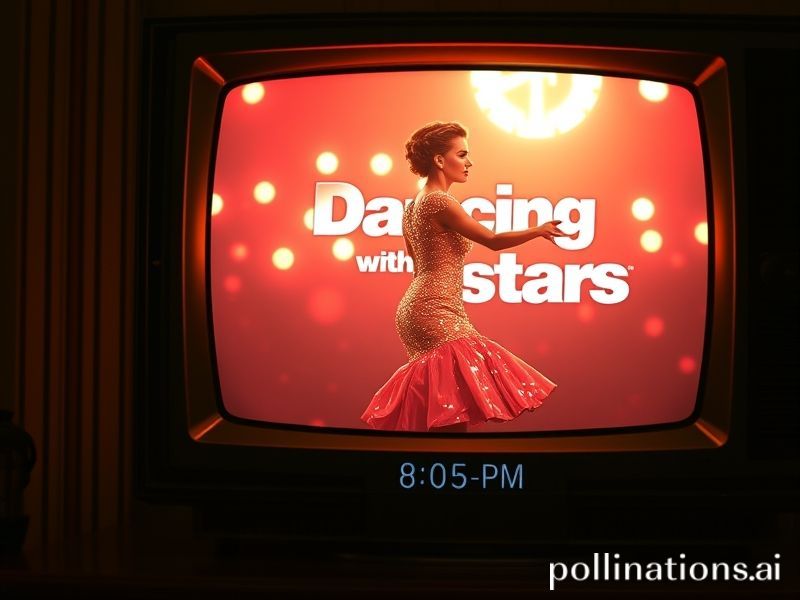Global Countdown to Glitter: Why the Whole World Asks ‘What Time Is Dancing With the Stars On?’
The Curious Case of Global Schadenfreude: What Time Is Dancing With the Stars On (And Why the World Secretly Cares)
Somewhere between the melting permafrost of Siberia and the latest crypto-bro meltdown in Singapore, a question ricochets through 192 sovereign time zones with the urgency of a UN Security Council resolution: “What time is Dancing With the Stars on tonight?” It isn’t listed on any G7 agenda, yet the query lights up VPN servers from Lagos to Lapland like a North Korean missile launch. Why? Because in 2024, sequins and spray-tanned redemption arcs have become the last universally translatable language—far more reliable than Google Translate and slightly less humiliating than the dollar.
Let us begin with the obvious: the show airs at 8 p.m. Eastern, 7 p.m. Central, and at whatever ungodly hour your local broadcaster decides to torture insomniacs—unless you’re in Western Australia, where it’s breakfast television served with Vegemite-flavored guilt. But that’s the dull arithmetic of television grids. The deeper question is why a ballroom-dancing competition—essentially civilized nations voting on which celebrity can avoid tripping over their own ego—still commands the synchronized heartbeats of a planet that can’t synchronize climate policy.
Consider the geopolitical choreography. In Warsaw, viewers stream it on Polsat to see whether their former finance minister can fox-trot his way out of a corruption scandal. In Buenos Aires, inflation-weary porteños cling to the fantasy that a disgraced footballer might find absolution in a perfect paso doble, preferably before the peso devalues again. Meanwhile, Beijing’s censors allow the show on iQiyi—trimmed of any “decadent” same-sex pairings—because nothing pacifies a restless middle class like watching the wealthy stumble in real time. The global takeaway: if you can’t fix supply chains, at least fix your frame.
The European Union, ever the bureaucratic chaperone, has tried to harmonize broadcast windows under its Audiovisual Media Services Directive. The result? A continent-wide argument about whether 20:45 CET respects prime-time “cultural sovereignty” or merely annoys the Spanish, who are still digesting dinner at that hour. Brussels has managed to make even sequins feel like a trade dispute. One imagines Eurocrats in grey suits negotiating the tempo of a Viennese waltz with the same solemnity they apply to gas pipelines. Spoiler: the waltz loses.
Then there’s the mercenary poetry of streaming. Disney+ Hotstar beams the show to Mumbai commuters wedged between armpits and destiny; they watch on mute, inferring scores from the judges’ Botox mobility. In Lagos, StarTimes subscribers pirate the feed, overlaying pidgin subtitles that translate Bruno Tonioli’s ecstatic shrieks into existential Yoruba proverbs. The entire enterprise becomes a master class in soft-power laundering: American tears over a B-list sitcom star’s redemption arc become Nigerian memes, Korean GIFs, Brazilian WhatsApp stickers—proof that globalization works best when no one’s paying royalties.
Of course, beneath the glitter lurks the darker pas de deux of late-stage capitalism. Each time zone’s broadcast is strategically staggered to maximize Twitter spoilers and TikTok reaction videos, which are then harvested by data brokers to sell you ergonomic dance shoes you’ll never wear. The algorithm knows you’re watching in Reykjavik at 2 a.m. because daylight is a myth there in February; it also knows you’re vulnerable enough to buy a limited-edition mirrorball tumbler. Somewhere, a Silicon Valley intern is A/B testing whether guilt or nostalgia moves more units. Hint: it’s both.
And yet, humanity persists in this collective choreography. Why? Because Dancing With the Stars offers what COP summits, Davos panels, and the WTO cannot: a finite narrative arc with commercial breaks. The planet may be on fire, but the fire is sequined, and it’s scheduled to end before the local news. In a fractured world, the shared question of “what time” becomes a small, glittering treaty: we may starve, flood, or get vaporized by a rogue drone, but we’ll do it knowing exactly when to vote for the underdog soap-opera star with the bum knee.
So set your alarms, comrades of the cosmos. Whether you’re in a bomb shelter in Kyiv, a boardroom in Dubai, or a favela in Rio, the mirrorball spins at the same astronomical second for all of us. And if that isn’t the most beautifully futile form of world peace, I don’t know what is.







